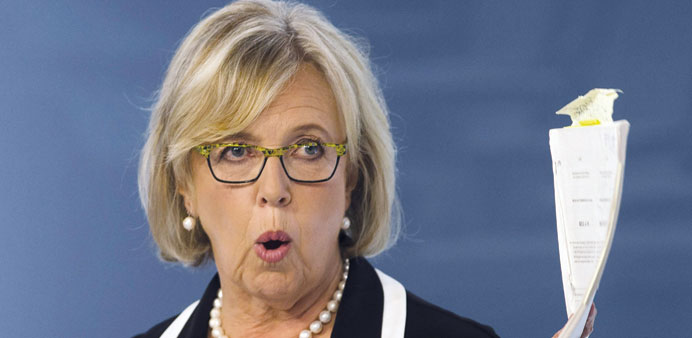Reuters/Vancouver
The Green Party, which is in fifth place behind the separatist Bloc Quebecois in Canada’s closely fought election, is banking on its rivals’ promises of electoral reform to help boost its showings in future elections.
Led by Elizabeth May, a fiery lawyer and vocal opponent of Prime Minister Stephen Harper, the Green Party has in recent years broadened its message from a single issue - the environment - into what it believes is a viable alternative for progressive voters.
This has helped boost its support, but with its supporters spread unevenly across the country, Green candidates are projected to take just one seat in Canada’s competitive first-past-the-post system.
This has the Greens hoping that Liberal leader Justin Trudeau and New Democratic Party leader Tom Mulcair will stick with their early promises of reforming Canada’s electoral system, if vaulted to power in today’s vote.
“We have to get rid of first-past-the-post,” said May, 61, last week. “I’ve heard both Justin Trudeau and Tom Mulcair say it, and with Green MPs in parliament, we’ll hold them to their word.”
Canada’s current electoral system allows a party to win a majority government with less than 40% of the vote.
Current front-runner Trudeau has promised to study alternatives and introduce reform legislation within the first 18 months of his term. Mulcair has backed a mixed-member proportional system, where each voter would cast two ballots - one for a local representative and one for the preferred party.
The Greens would be the big winners in a proportional system - projected to take about 4.5% of popular vote, they would get roughly 13 seats, enough for official party status, which comes with perks like more money, offices and staff.
Greens have fared well in Germany, Latvia and Ireland, which use proportion or mixed electoral systems. Britain, which has a first-past-the-post system, has just one Green lawmaker.
“Undoubtedly the Greens would probably have more influence than they do now,” said Elizabeth Goodyear-Grant, associate professor of political science at Queen’s University in Kingston, Ontario.
“And especially if they could play a ‘Kingmaker’ role in a coalition.”
Despite Trudeau’s promise to study the issue, she was unsure if the Liberals would move ahead with reform should they take power.
“For most of their history the Liberals have not been supportive of this, because they’ve benefited in the past,” she said. “I wouldn’t be surprised if the Liberals back off a bit.”

